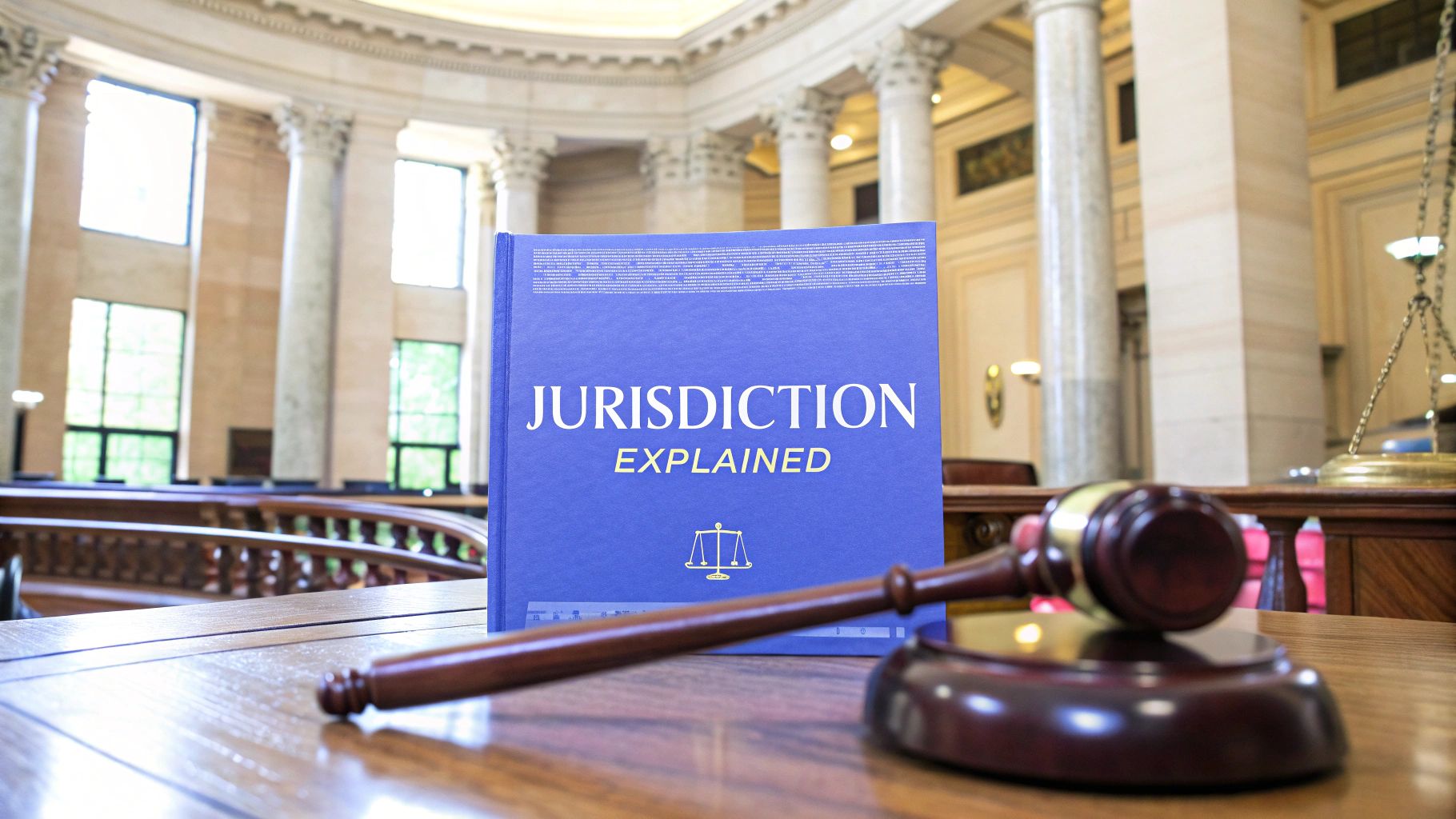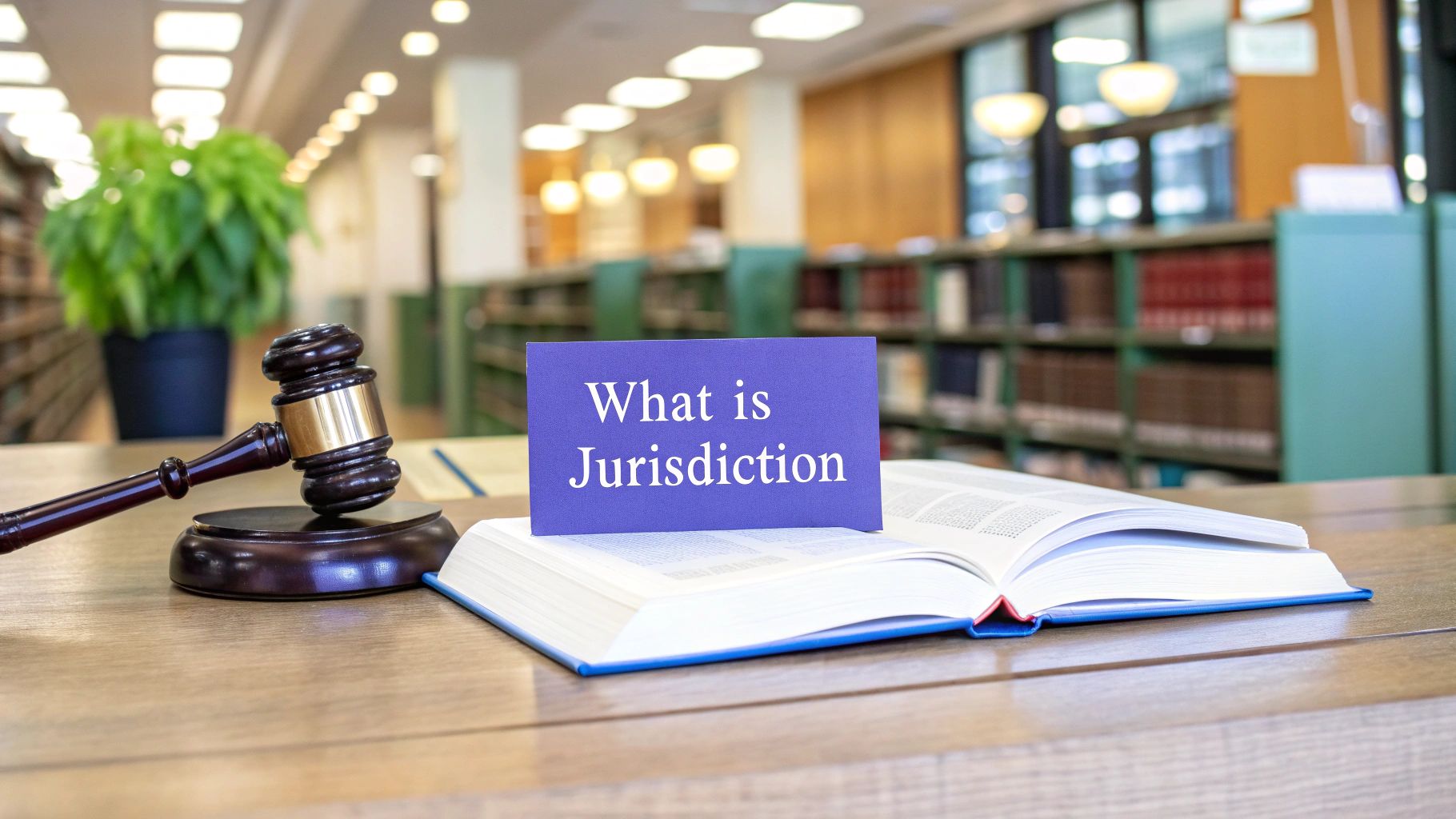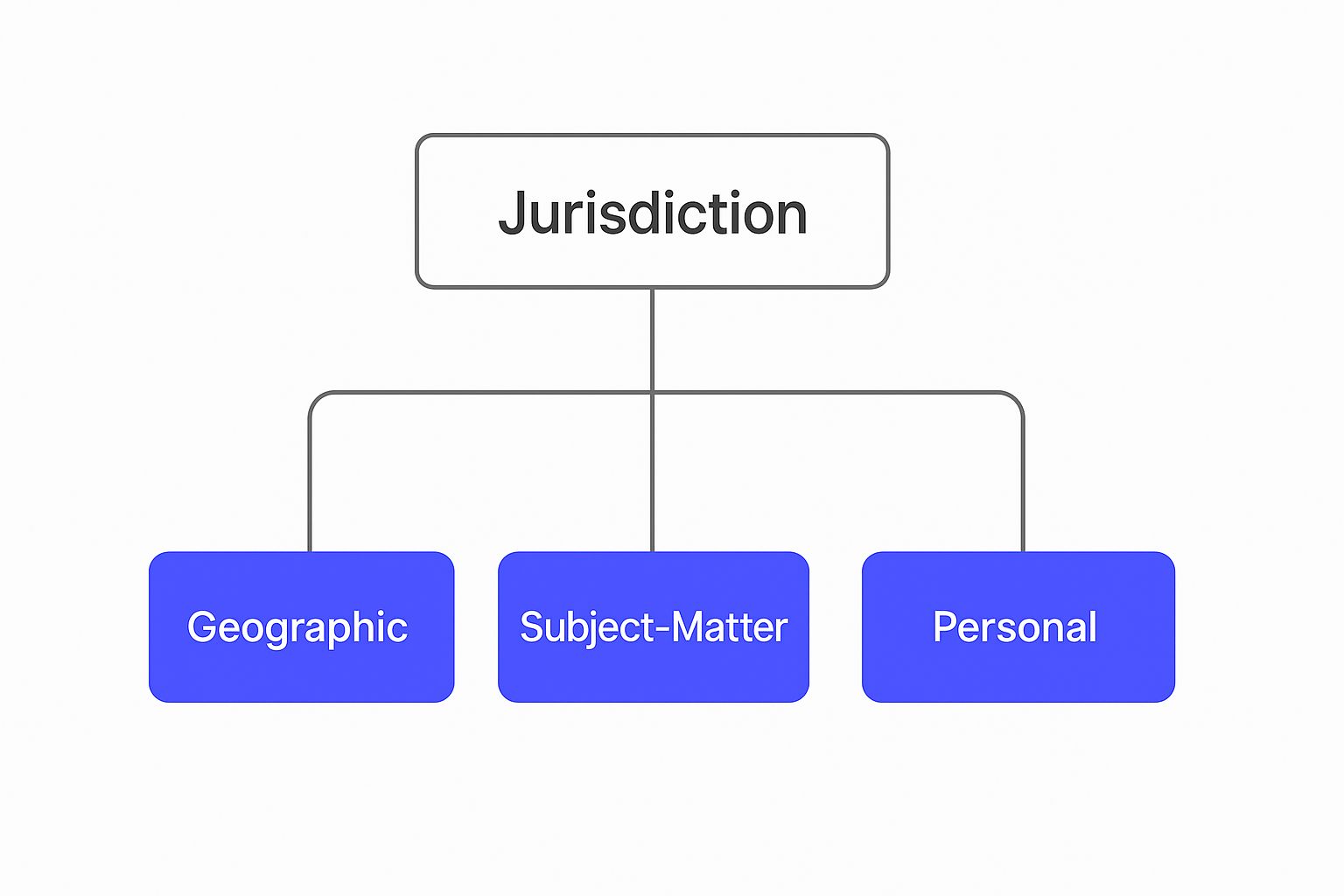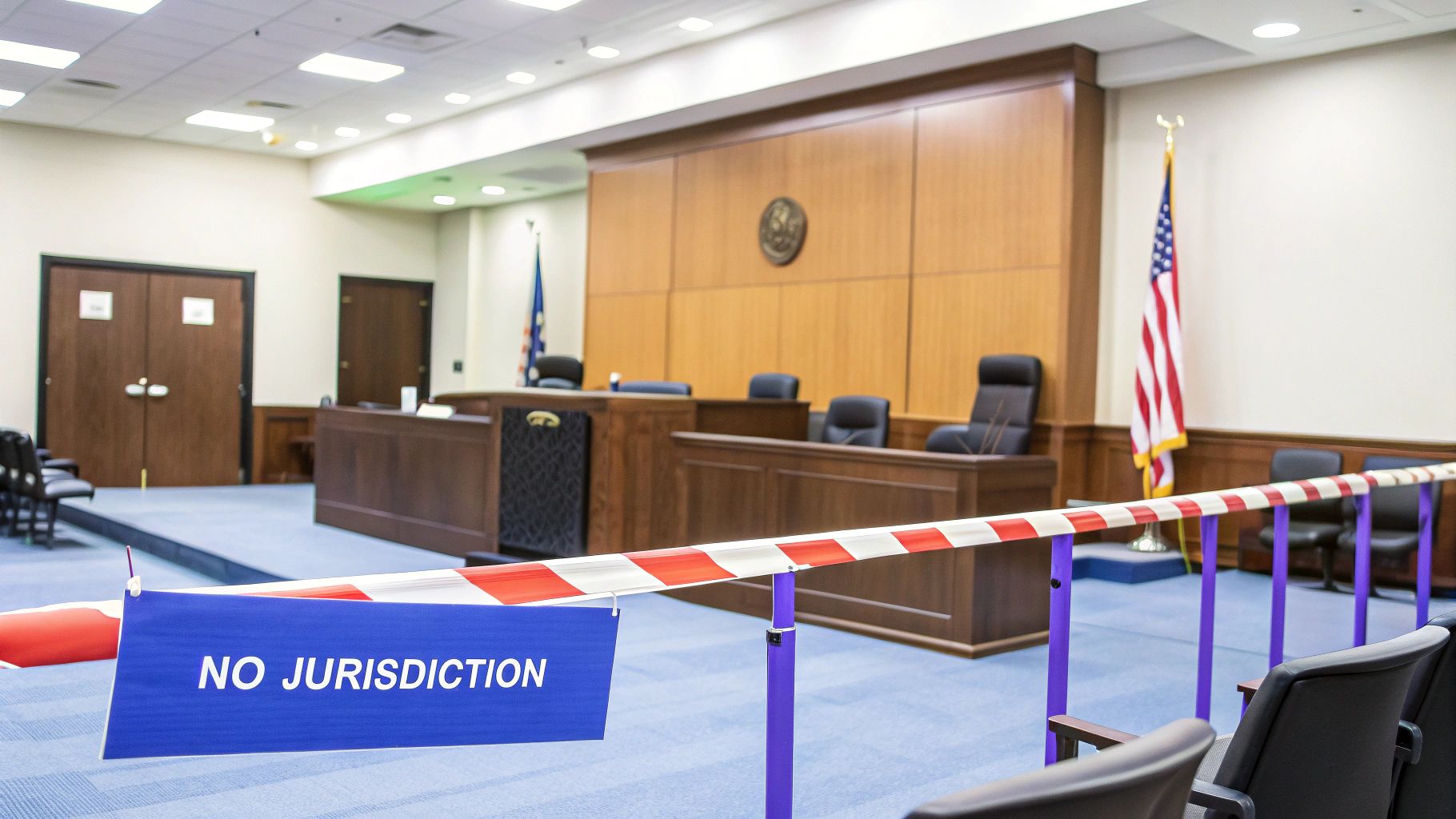
So, what exactly is jurisdiction? You’ve probably heard the term thrown around, but what does it actually mean in the real world?
In the simplest terms, jurisdiction is a court's official power to make legal decisions and pass judgments. It’s what gives a court the authority to even hear a case in the first place. Think of it like a referee at a football game—they only have the authority to make calls for that specific game, on that specific field, involving those specific players.
What Is Jurisdiction Without the Legal Jargon

It’s helpful to think of jurisdiction as a set of boundaries that grant a court its power. These aren’t just lines on a map; they’re a collection of rules that dictate who can be brought to court, where a case can be heard, and what kind of issues a court is even allowed to decide. If a court acts outside of these boundaries, its rulings are essentially invalid.
This idea isn’t new. The concept of jurisdiction has deep roots in Roman law and became critical as modern nations formed, tying a court’s power directly to a sovereign territory. As legal systems evolved, so did the rules defining their authority. You can see how other core legal concepts have changed over time by exploring other common legal terms explained in our guide.
To really get what jurisdiction is all about, let’s go back to our sports analogy. For a referee's call to be considered legitimate, three things have to be true:
- The ref must have authority over the players in the game (this is like personal jurisdiction).
- The call has to happen on the designated field of play (this is like territorial jurisdiction).
- The ref needs to be officiating the right sport—they can't use basketball rules in a football game (this is like subject matter jurisdiction).
If any one of those pieces is missing, the referee's call doesn't count. A court's power works in much the same way.
Key Takeaway: Jurisdiction is the foundational requirement for any legal action. It’s the system that ensures legal proceedings are fair, predictable, and handled by a court that has the legitimate authority to do so.
The Core Components of Jurisdiction
To make this crystal clear, here's a quick breakdown of the three essential pillars that make up a court's authority.
| Component | Simple Explanation | Analogy |
|---|---|---|
| Personal | The court's power over the people or entities involved in the case. | The referee's authority over the specific players in the game. |
| Territorial | The geographical area where the court has power to act. | The designated field or stadium where the game is being played. |
| Subject Matter | The court's authority to hear a specific type of case. | The referee having the rulebook for football, not for another sport. |
Understanding these three components is the first step to figuring out why a lawsuit can be filed in one state but not another, or why certain cases end up in federal court instead of a local one. Each piece is critical for a court’s decision to be valid and enforceable.
The Three Main Types of Legal Jurisdiction
To really get what jurisdiction means, you have to break it down into its three core types. Think of them as three legs on a stool—if one is missing, the whole thing topples over. A court needs to satisfy all three for its decisions to be legitimate and legally binding.
The infographic below shows how these three components—Personal, Subject-Matter, and Territorial—are the pillars supporting a court's authority.

For a court's power to hold up, it must have authority over the person, the issue, and the place. Let's dig into what each of these means in the real world.
Personal Jurisdiction: The Power Over People
First up is personal jurisdiction. This is all about a court's power over the specific people or companies involved in a case. A court can't just pull anyone into a lawsuit from anywhere; it needs a solid connection to them.
It's like an invitation to a party. You can only "invite" someone to your party (the lawsuit) if they have a real link to your house (the jurisdiction). This link is usually established in a couple of ways:
- Residency: The person lives there, or the company has its main office within the court’s geographical area.
- "Minimum Contacts": The person or company did business, caused an accident, or has some other meaningful connection to the area.
For example, if someone from California causes a car wreck in Nevada, a Nevada court has personal jurisdiction over them. Why? Because the incident happened on Nevada soil, establishing those crucial "minimum contacts."
Subject Matter Jurisdiction: The Power Over the Topic
Next, we have subject matter jurisdiction, which refers to a court's authority to hear a certain type of case. Not every court can handle every kind of legal problem. Many are specialized to make sure the right experts are on the job.
Think of it like a hospital. You wouldn't see a cardiologist for a broken ankle. Courts are set up the same way.
A court's subject matter jurisdiction acts like a specialization, ensuring the right "legal doctor" is handling the right case. It guarantees that a complex patent dispute doesn't end up in a small claims court designed for minor landlord-tenant issues.
Here are a few common examples of specialized courts:
- Bankruptcy Courts: Only hear cases about debt and financial insolvency.
- Family Courts: Handle matters like divorce, child custody, and adoption.
- Tax Courts: Focus on disputes between taxpayers and the IRS or state tax agencies.
If a case gets filed in a court that lacks the proper subject matter jurisdiction, any ruling it makes is automatically void.
Territorial Jurisdiction: The Power Over the Place
Finally, there’s territorial (or geographic) jurisdiction. This one is the most straightforward—it defines a court's power based on its physical, geographical boundaries. It’s the court’s home turf, plain and simple.
A city court in Phoenix, for instance, only has authority over things that happen within Phoenix city limits. It has no power to hear a case about a speeding ticket issued in Tucson. Similarly, a Texas state court has jurisdiction over matters inside Texas, but it can’t touch something that happened entirely in Oklahoma.
These borders are firm, drawing a clear line around the court's geographical playing field.
How Jurisdiction Impacts Daily Life and Business
 The concept of jurisdiction isn't just a technicality for lawyers to debate in a courtroom. It's a powerful force that quietly shapes our daily lives and business dealings, especially in our hyper-connected world.
The concept of jurisdiction isn't just a technicality for lawyers to debate in a courtroom. It's a powerful force that quietly shapes our daily lives and business dealings, especially in our hyper-connected world.
Every time you do something that crosses a state or national line—even if it's just a click online—you're bumping up against jurisdictional rules.
Think about it. You buy a product from an online store based in another country. If it shows up broken, which country's consumer protection laws apply? The answer lies in jurisdiction, which often hinges on where the company aims its business.
Navigating a Borderless Digital World
The internet might feel borderless, but in the eyes of the law, those borders are more important than ever. Jurisdictional questions pop up constantly in the digital realm.
For example, what about a defamatory social media post? If someone in Germany posts a false statement about a person living in Canada, which country’s courts have the power to hear the case? Courts often use an "effects test" to see where the harm was actually felt, which could give Canadian courts jurisdiction even if the author never set foot in the country.
This extends to the modern workforce, too. A company in New York with a remote employee in Spain has to juggle a complex web of labor laws from both places, covering everything from paychecks to termination rights.
Jurisdiction as the Engine of Global Commerce
On a much bigger scale, jurisdiction is the bedrock that makes global trade and finance possible. Without clear rules about which country's laws govern a deal, international business would grind to a halt under a mountain of uncertainty and risk.
These agreements create the stability needed for massive cross-border transactions. As of the first quarter of 2025, global cross-border bank credit hit an unprecedented $34.7 trillion. This massive flow of capital depends entirely on well-defined jurisdictional systems to regulate contracts and resolve disputes. You can dive deeper into these trends with data from the Bank for International Settlements.
Key Insight: Jurisdiction provides predictability. It gives businesses the confidence to enter into agreements, knowing there’s a clear legal path to resolve disputes, no matter where the other party is based.
This predictability is crucial for everything from international shipping contracts to managing financial assets across borders. For any business, understanding these rules is a fundamental part of effective contract compliance management, ensuring all parties know their rights and responsibilities.
Ultimately, jurisdiction stops being an abstract legal idea and becomes a tangible, essential piece of our modern, interconnected economy.
Why the Jurisdiction Clause in Your Contract Is Crucial
While "jurisdiction" sounds like a high-level legal concept, it has a very real, very powerful impact on anyone signing a contract. Tucked away in the fine print, you'll almost always find a jurisdiction clause—sometimes called a "forum selection clause." It’s easy to skim past, but it’s one of the most critical parts of the entire agreement.
This little clause decides, in advance, which court gets to hear any disputes that pop up. Ignoring it can be an incredibly expensive mistake. If you agree to the wrong jurisdiction, you could find yourself forced to fight a legal battle thousands of miles from your home base.
A Tale of Two Businesses
Let’s put this into perspective. Imagine a small software company in Chicago, Illinois, signs a deal with a big marketing firm in Los Angeles, California. They’re excited to launch a new product together. Buried deep in their contract is a jurisdiction clause that says any legal action must be filed in Los Angeles County.
Everything starts off great. But a year later, a serious disagreement over payment blows up. The Chicago team believes they're owed $75,000, but the L.A. firm is digging in its heels and refusing to pay.
Because of that tiny clause, the Chicago business can’t just walk down to their local courthouse. They’re now forced to hire lawyers in California, fly their people out for meetings and court dates, and try to navigate a legal system they don't know. The costs start spiraling, making it almost too expensive to even fight for the money they’re rightfully owed.
With one sentence, all the power and convenience have shifted to the L.A. firm.
Key Insight: The jurisdiction clause isn't just a formality; it's a strategic weapon. The party that chooses the jurisdiction gains a massive "home-field advantage," creating logistical and financial nightmares for the other side.
Getting this clause right is a fundamental piece of effective contract risk management, as it directly impacts your ability to enforce your rights without breaking the bank.
Jurisdiction Clause Showdown: Local vs. Distant Court
The practical difference between a good and bad jurisdiction clause is night and day. Let's break down the real-world impact of keeping a legal dispute on your home turf versus having to fight it in a distant court.
| Factor | Local Jurisdiction (Your Home Turf) | Distant Jurisdiction (Their Home Turf) |
|---|---|---|
| Legal Costs | You can use your trusted, local attorneys at their standard rates. | You must find, vet, and hire new lawyers in another state, often at higher, unfamiliar rates. |
| Travel Expenses | Minimal. Your team and witnesses are already nearby. | Significant costs for flights, hotels, and transportation for your team and any necessary witnesses. |
| Convenience | Proceedings are close by, minimizing disruption to your business operations. | You lose valuable time and productivity traveling and managing a case from afar. |
| Familiarity | You and your lawyer are comfortable with the local court rules and procedures. | You are on unfamiliar ground, which can be a strategic disadvantage against a local opponent. |
When you get down to it, the jurisdiction clause can single-handedly decide whether fighting for your rights is practical or just too expensive to even try. Always spot this clause and think through the consequences before you sign. It dictates the battlefield where any future fight will take place.
Jurisdiction as a Tool Against Global Crime

When we hear the word "jurisdiction," we usually think of its limits—the lines on a map that a court can't cross. But in the global fight against crime, those same lines become critical tools for cooperation. Criminals, from money launderers to cyber-fraudsters, are experts at exploiting these jurisdictional gaps.
They intentionally spread their operations across multiple countries. The evidence might be in one nation, the criminals in another, and their victims in a third. This strategy is designed to paralyze law enforcement because no single country has the authority to investigate, arrest, and prosecute all on its own.
Building a Global Neighborhood Watch
To plug these loopholes, countries have to work together through international treaties and agreements. These legal frameworks essentially create a "global neighborhood watch," where different nations agree to share information and lend each other a hand. Think of it like neighboring police departments agreeing to help each other catch a suspect who keeps fleeing across city lines.
This cooperative approach transforms jurisdiction from a barrier into a powerful weapon. For instance, if a fraud ring in Eastern Europe targets victims in the United States, the FBI can’t just fly over and make arrests. But through what are called mutual legal assistance treaties (MLATs), U.S. authorities can formally ask their European counterparts to gather evidence or even detain suspects on their behalf.
Key Insight: International jurisdiction isn't about one country forcing its will on another. It's a system built on voluntary cooperation and mutual respect, allowing nations to team up against criminals who don't respect any borders.
This kind of collaboration is absolutely vital for tackling illicit financial flows. By 2030, it's estimated that the amount of money moved illegally across borders could balloon to USD 4.5 to 6 trillion. That staggering number shows just how big this challenge is. A country's ability to exercise jurisdiction over financial crimes directly impacts its power to fight widespread corruption and money laundering. You can explore the full global economic crime outlook here.
The Mechanics of Cross-Border Justice
So, how does this all work in practice? This cooperative framework is built on a few key mechanisms that extend a nation’s legal reach far beyond its own borders:
- Extradition Treaties: These are the formal pacts where one country agrees to hand over a fugitive to another country where they are accused or have been convicted of a crime.
- Information Sharing: Law enforcement agencies from different countries, often coordinated by groups like Interpol, share intelligence on criminal activities and wanted individuals.
- Joint Investigations: In complex cases that span multiple territories, you'll often see teams made up of officers from several nations working together.
Ultimately, these tools redefine jurisdiction. It's no longer just a wall, but a bridge. By linking their legal powers, countries create a united front against those who try to operate in the shadows between national laws, making sure justice has a truly global reach.
Got Questions About Jurisdiction? Let's Unpack Them.
Even once you've got a handle on the basics, jurisdiction can throw some curveballs, especially when you mix in modern technology and global business. Let's tackle some of the most common—and often confusing—questions people have about how legal authority actually works in the real world.
Think of this as your go-to guide for those tricky "what if" scenarios. The answers will show you how courts untangle complex, overlapping, and sometimes messy jurisdictional challenges.
What Happens If Two Countries Claim Jurisdiction?
It’s a situation that pops up more than you’d think: a business deal goes sour, an online comment sparks a lawsuit, or an international incident creates a legal gray area where two different countries believe their courts have the right to step in. This is called a jurisdictional conflict.
So, who decides? There's no single world court with the final say. Instead, the outcome often hinges on a principle called "comity."
Comity is basically mutual respect between legal systems. It’s a doctrine where courts in one country will generally recognize and enforce the legal decisions of another, as long as those decisions don't clash with their own core public policies. It's less of a strict law and more of a diplomatic handshake to keep the global legal system from descending into chaos.
On top of that, international treaties often provide a clear roadmap. These agreements set the rules in advance for who has jurisdiction in specific areas like trade, extradition, or family law, creating a predictable framework to resolve conflicts before they even start.
Can You Change a Contract's Jurisdiction After It's Signed?
Imagine you’ve signed a contract, but the jurisdiction clause now looks incredibly inconvenient or just plain unfair. Can you change it? The short answer is: it’s extremely difficult.
A jurisdiction clause is a core part of the deal. To change it after the fact, you need a formal amendment or addendum to the original contract. This isn't something you can decide on your own; it requires the mutual, written agreement of all parties who signed the document in the first place.
Key Takeaway: Once a dispute has already kicked off, convincing the other side to move the legal fight to your home court is next to impossible. They hold a massive strategic advantage and have almost zero incentive to give it up.
This is exactly why that clause demands your full attention before you sign. It’s one of the few parts of a contract that becomes almost set in stone right when you need it most. Trying to change it after a disagreement is like trying to change the rules of the game after the final whistle has blown.
How Does Jurisdiction Work on the Internet?
The internet bulldozed geographical borders for business and communication, but it created a giant headache for legal systems built on physical territories. How can a court in Ohio possibly claim authority over a website run from Australia?
This is one of the most rapidly evolving areas of law, but courts have generally landed on two main tests to see if they can pull an online entity into their courtroom:
- The "Minimum Contacts" Test: This classic legal idea has been stretched to fit the digital age. A court will look for proof that the website or online business deliberately directed its activities toward the court's geographical area. This could mean shipping products to residents, running targeted ad campaigns in that state, or having a significant customer base there. A passive website that anyone can view from anywhere usually isn’t enough—there has to be proof of active engagement.
- The "Effects Test": This test zeroes in on where the harm of an online action was actually felt. For example, if a defamatory blog post written in another country specifically targets and damages the reputation of someone living in Florida, a court in Florida might claim jurisdiction because the "effect" of the action was centered there.
These tests help courts figure out if an online business has a strong enough connection to a place to be subject to its laws, ensuring that jurisdiction in a borderless world remains tied to fairness and purposeful action.
Understanding contract details like jurisdiction clauses can feel overwhelming, but you don't have to do it alone. Legal Document Simplifier uses powerful AI to scan your contracts and highlight critical terms, deadlines, and potential risks in plain English. Stop guessing and start making confident decisions. Upload your document today and see how easy legal clarity can be.
Learn more and get your first summary at Legal Document Simplifier